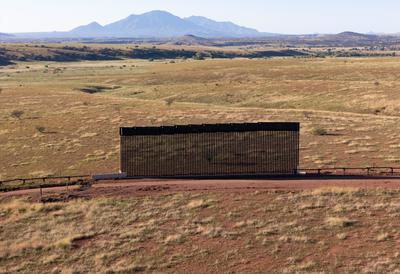Decades of conservation efforts in Central and South America are starting to pay off, with increased protections for jaguars and the corridors that connect them. But the construction of the border wall is creating a roadblock to the big cat’s return to the U.S. Southwest.
Arizona’s San Rafael Valley, a sparsely settled desert valley along the Mexican border, is one of the most biodiverse places on the continent. Recently, camera traps here have captured multiple images of a prowling male jaguar.
The sightings have been encouraging to biologists and conservationists who hope the big cats will move north from Mexico — where their numbers are growing — and reestablish the first breeding population since the animal was extirpated from Arizona in the 1960s.
A natural return of the jaguar to the United States, though, may be growing less likely, not more, as the Department of Homeland Security continues to build a 27-mile-long, 30-foot-tall black metal wall through the heart of the valley, part of President Trump’s effort to block human migration from Mexico into the U.S.
“There’s a handful of remaining gaps in the wall, and the most important of those for the jaguar is the San Rafael Valley, which is being built as we speak,” said Taylor McKinnon, the Southwest director of the Center for Biological Diversity, in Tucson, which in July filed a lawsuit to halt the project. A 2024 study found that the existing border wall caused a severe decline in migration of terrestrial mammals, including ocelots, mountain lions, and bears that regularly move across the border in this part of Arizona.
Ranchers and government trappers had effectively wiped out jaguars in the U.S. by the middle of the 20th century.
Scientists believe that the cat seen on cameras, named O:ṣhad Ñu:kudam by the Tohono O’odham Nation, may have migrated from the Northern Jaguar Reserve, a 56,000-acre preserve in the foothills of the Sierra Madre Occidental, about 150 miles south of the border in Sonora.
The southwestern U.S. is the northern tip of a very long swath of jaguar territory; the big cats are found in 19 countries throughout Central and South America, all the way to Argentina (only Uruguay and El Salvador have no jaguars). After a marked decline in jaguar numbers in the 1990s, scientists, conservationists, and government officials realized the animal needed help and came together to create a conservation plan across the species’ range. While the jaguar still faces serious and growing threats, efforts across Latin America are paying dividends.
The jaguar, Panthera onca, once roamed across southern Arizona as far north as the Grand Canyon, New Mexico, and Texas, and it occasionally traveled farther afield, to Louisiana and California. Ranchers and government trappers effectively wiped out the species by the middle of the 20th century. The last confirmed female in Arizona was killed in 1963, and the last female in New Mexico was killed in 1986.
Part of a new border wall being built in Arizona's San Rafael Valley.Rebecca Noble / Bloomberg via Getty Images
Some experts believe it’s time to reintroduce the species into the U.S. rather than wait for them to return on their own. “Reintroduction is practical and feasible over a realistic time horizon,” a group of researchers from conservation groups and universities wrote in a 2021 study. “Returning the jaguar to this area will enhance the recovery of an endangered species in the United States, further its range-wide conservation, and restore an essential part of North America’s cultural and natural heritage.”
But with construction crews rapidly closing the remaining gaps in the border wall, both natural recovery and reintroduction will become increasingly difficult, if not impossible. “Gene flow is really important to a population,” said Susan Malusa, a researcher and coordinator of the University of Arizona Wild Cat Research and Conservation Center. It makes no sense “to introduce jaguars on this side of the border and put up a giant wall. We can’t have our jaguars and their jaguars. That is not a good idea.”
The global jaguar population has declined by half from its historic high at the beginning of European colonization, and according to Panthera, a nonprofit focused on wild cats, it continues to fall. There are now an estimated 173,000 of the animals, half of them in Brazil.
Ensuring the future of jaguars also protects a wide range of other species, including tapirs, sloths, and giant armadillos.
Nonetheless, the preservation of the jaguar is a remarkable story of international cooperation. In the 1990s, wildlife experts grew concerned about the steep drop in jaguar numbers throughout their range, which was due mostly to habitat loss — through deforestation and the expansion of farms and ranches — and urban encroachment into wildland. Poaching and predator control efforts have also taken a significant toll.
In 1999, a group of global experts, organized by the Wildlife Conservation Society, came together to create a research and conservation plan across the jaguar’s entire range. The effort identified 51 existing jaguar strongholds — areas that contain 50 or more breeding individuals. Later, the number of strongholds was increased to 86 and researchers delineated 182 corridors that connected them across a total of 1.7 million square miles between Mexico and Argentina.
Shortly after the plan was developed, a DNA study established that there was sufficient gene flow throughout these populations to maintain a diverse gene pool. Such diversity helps maintain a variety of traits, boosting a population’s ability to adapt to ecological changes and resist disease.
In 2010, the Jaguar Corridor Initiative was launched to lobby for increased protection of the disparate jaguar populations and corridors, and since then protection efforts have grown more robust. Paraguay, Brazil, Bolivia, and Argentina have announced a project to protect and restore nearly 1 million square miles of fragmented habitat along the Parana River Basin. And at a meeting in Mexico last month, all of the jaguar range countries agreed to an updated conservation plan that will address habitat loss and the trafficking of jaguar parts.
A broad range of conservation organizations is using camera traps, GPS collars, and genetic studies to track and monitor individual animals. Conservationists are also working with farmers and ranchers to alter their livestock practices — installing electric fences to keep jaguars out and using guard donkeys and guard cattle that have been bred to drive off predators. Some countries offset livestock losses with payments.
Jaguars are an umbrella species, and because they have large home ranges — almost 40 square miles for females and more than 50 square miles for males — ensuring their future also protects a wide range of other species, including white-lipped peccaries, lowland tapirs, two- and three-toed sloths, and giant armadillos.
One of the strategies to protect the jaguar throughout its range has been to highlight ancient cultural ties to the animal.
Jaguars are the world’s third largest species of wild cat, growing up to 6 feet long — not counting the tail — and weighing as much as 350 pounds. Dark brown rosettes mark their distinctive tawny coats. With their powerful jaws, jaguars kill prey by piercing their skull. They are known to eat 85 different species across their range. “Everything from peccaries to tortoises are on the menu,” said Allison Devlin, director of Panthera’s jaguar program.
That menu also includes domestic animals. Among the top threats to jaguars are landowners who lose livestock to the cat. “For these rural families, cows are like a bank account,” said Devlin. “So if they lose a single cow it could be a major loss to their family’s financial and food security.”
A more recent threat comes from abroad. As wild tiger populations in Asia decline, and prices for their parts on the black market have risen, jaguars have become a replacement source. Numbers are hard to come by, but according to a 2021 report by the Convention on International Trade in Endangered Species, 61 jaguars are poached each year in Bolivia alone. Jaguar genitals are prized as aphrodisiacs, jaguar fangs for jewelry and amulets, and skins for rugs and fashion.
The jaguar's historic range extended from Argentina to the U.S. Southwest. Source: Panthera.Yale Environment 360
Climate change is another major factor in the decline of the jaguar. Brazil’s Pantanal is the world’s largest tropical wetland and is home to the second largest population of jaguars and a myriad of other species. “In the wet season these wetlands are flooded with 3 meters of water,” said Devlin. “But the wet season is much drier [now] and the dry season is persisting longer… In the last five years, because of the drying, there have been very severe fire outbreaks.”
Millions of vertebrates died in major fires in the Pantanal in 2020, from tapirs to giant anteaters to marsh deer. A recent study found that the fires negatively impacted nearly half the jaguar population by killing its prey and destroying habitat.
Jaguars are, without a doubt, charismatic megafauna, and efforts to conserve the species tend to receive a good deal of favorable media attention — including stories about orphaned cubs being taught to hunt or swim, especially in Brazil with its large populations.
One of the strategies to protect the jaguar throughout its range has been to highlight ancient cultural ties to the animal and create new connections by teaching children in local communities about the importance of jaguar conservation. Jaguars were central to the beliefs of the Mayans, whose God L jaguar deity was associated with the underworld and ruled over darkness. During ayahuasca ceremonies, in which participants drink a psychoactive beverage, shamans in Amazonia are believed to transform into jaguars for healing or to gain wisdom. The Guarani people in Paraguay, Brazil, and Argentina believe that jaguars guard sacred sites.
Mexican officials recently announced that since 2010, the number of jaguars in that country had increased 30 percent.
The animal recently spotted on cameras in southern Arizona was treated by the area’s Indigenous people as a homecoming. “The return of jaguars to our land is a source of immense pride and profound hope,” said Austin Nunez, a chairman of the Tohono O’odham whose Arizona reservation abuts the Mexican border. “As O’odham, we view jaguars as protectors of our people and the environment.”
Mexican officials recently announced that since the last census of jaguars, in 2010, the number of cats in that country had increased 30 percent, from 4,100 to 5,326. They are still listed as endangered, however, and won’t be removed from the list until their population reaches about 8,000.
Just over the U.S. border, conservationists and researchers have been debating whether to reintroduce jaguars in Arizona or wait for their natural return. In 2022 the Center for Biological Diversity petitioned the U.S. Fish and Wildlife Service to reintroduce the animals to Arizona, but the petition was denied last year. Among other objections, the agency said there was no donor population.
A jaguar recently caught on camera in southern Arizona.University of Arizona Wild Cat Research and Conservation Center
The 2021 study suggested that conditions for the reintroduction of up to 150 jaguars in the mountains of central Arizona and New Mexico were favorable because “human actions… no longer pose a threat” to the animals and the proposed reintroduction area is “vast, covered with suitable vegetation, and well populated with prey.” State and federal officials say that reintroduction would be expensive and that the landscape could support only a handful of jaguars.
Reintroducing jaguars in Argentina, where they were hunted to local extinction in the 1950s, is already underway. In 2010, eco-philanthropists Kris and Doug Tompkins founded Rewilding Argentina and began to restore the Ibera Wetlands, in the nation’s northeast. Their efforts included a captive breeding program that has, so far, reintroduced about a dozen jaguars to Ibera and five to El Impenetrable National Park. Still, there has been notable conflict with the region’s ranchers.
Sebastián Di Martino, the conservation director of Rewilding Argentina’s reintroduction program, has visited southern Arizona to see if such a project might be feasible there. He believes jaguars would thrive in the region and that reintroducing them would be straightforward.
“How to breed jaguars, how to transfer jaguars, how to deal with genetics, those kinds of issues, that is the easy part of the work,” said Di Martino. “The most difficult part is to build social and political support for the animals. The species is the same everywhere, but the politics are very different.”
Correction, October 16, 2025: An earlier version of this article incorrectly stated the number of jaguars reintroduced to Argentina’s Ibera Wetlands and El Impenetrable National Park. About a dozen have been reintroduced to Ibera and five to El Impenetrable.



No comments yet. Be the first to comment!